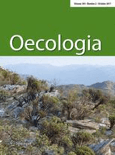
OECOLOGIA
metrics 2024
Pioneering Research at the Frontier of Ecology and Behavior
Introduction
OECOLOGIA is a prestigious journal dedicated to the interdisciplinary fields of ecology, evolution, behavior, and systematics, published by Springer. Established in 1968, this journal has consistently contributed to the scientific community, maintaining a strong impact factor reflected in its Q1 ranking within its category for 2023, and an impressive 79th percentile among 721 journals in the Scopus rank for Agricultural and Biological Sciences. With a commitment to advancing ecological knowledge and fostering innovative research, OECOLOGIA serves as a vital platform for researchers, professionals, and students exploring complex ecological dynamics and evolutionary processes. Although it does not offer open access, the journal remains dedicated to high-quality, peer-reviewed publications that inspire and inform the next generation of ecological science. For those interested in the latest trends and significant findings in biology and ecology, OECOLOGIA is an essential resource that continues to shape the discourse and understanding in these critical fields.
Metrics 2024
 0.96
0.96 2.30
2.30 2.80
2.80 220
220Metrics History
Rank 2024
Scopus
IF (Web Of Science)
JCI (Web Of Science)
Quartile History
Similar Journals
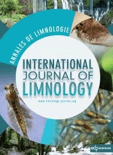
ANNALES DE LIMNOLOGIE-INTERNATIONAL JOURNAL OF LIMNOLOGY
Championing Open Access to Aquatic ResearchANNALES DE LIMNOLOGIE-INTERNATIONAL JOURNAL OF LIMNOLOGY is a distinguished scientific journal dedicated to the field of limnology, focusing on freshwater ecosystems and their ecological dynamics. Published by EDP SCIENCES S A, this journal has been a vital resource for researchers and professionals since 1965, fostering a deep understanding of aquatic environments through quality research and scholarly discussions. The journal was indexed in Scopus, where it ranked in the 37th percentile within the Agricultural and Biological Sciences category, emphasizing its contribution to aquatic science. While its coverage has been discontinued in Scopus since 2021, the journal continues to engage its readership with critical insights and reviews in limnology. ANNALES DE LIMNOLOGIE promotes open access to facilitate the dissemination of valuable knowledge, making it an essential platform for students, researchers, and professionals who strive to advance our understanding of freshwater systems.

RUSSIAN JOURNAL OF ECOLOGY
Fostering Interdisciplinary Dialogue in Ecological ScienceRUSSIAN JOURNAL OF ECOLOGY, published by PLEIADES PUBLISHING INC, stands as a critical resource within the field of ecology, offering an array of research insights that span various ecological topics. With an ISSN of 1067-4136 and an E-ISSN of 1608-3334, this journal has been consistently disseminating knowledge since its inception in 1996, now converging towards 2024. Despite its current Q4 ranking in the Ecology, Evolution, Behavior and Systematics category, the journal has carved out a niche in the publication landscape, particularly for scholars focused on the rich and diverse ecological phenomena of Russia and surrounding territories. The journal aims to foster interdisciplinary collaboration and innovation by providing a platform for the dissemination of high-quality research. While it currently lacks open access options, readers can expect in-depth studies and analytical discourses that contribute meaningfully to the global understanding of ecological systems. With an impressive Scopus rank, this journal remains an important outlet for researchers, professionals, and students committed to advancing ecological science.

ACTA OECOLOGICA-INTERNATIONAL JOURNAL OF ECOLOGY
Connecting Scholars to Transform Ecological PracticesACTA OECOLOGICA-INTERNATIONAL JOURNAL OF ECOLOGY, published by Elsevier, stands as a prominent platform for disseminating innovative research in the diverse field of ecology. Operating since 1983 and continuing to make significant contributions into 2024, this journal features critical studies that advance our understanding of ecological systems, behaviors, and conservation efforts. With an impressive Q2 ranking in both the ecology and nature conservation categories, it exemplifies high-quality scholarship, reflected in its Scopus rankings—#74 in Environmental Science and #254 in Agricultural and Biological Sciences. Researchers, professionals, and students in the field are invited to explore the latest findings and methodologies that address pivotal ecological issues. As a journal committed to fostering academic collaboration, ACTA OECOLOGICA is essential for anyone dedicated to enhancing their comprehension of ecological dynamics and advancing sustainability practices globally.

Ecosistemas
Unveiling the dynamics of nature through collaborative study.Ecosistemas is a prominent Open Access journal published by the ASOCIACION ESPANOLA ECOLOGIA TERRESTRE, specializing in the field of ecology. Since its inception in 2001, it has dedicated itself to advancing ecological knowledge and research, fostering an inclusive platform for the dissemination of cutting-edge studies that span ecological interactions, sustainability, and biodiversity. The journal, based in Spain, has established its reputation with notable rankings such as Q3 in the field of Ecology and Q4 in Ecology, Evolution, Behavior, and Systematics, reflecting its commitment to quality research. With a Scopus Ranks position placing it in the 40th and 37th percentiles for its categories, Ecosistemas is integral to the academic community, serving researchers, professionals, and students alike. It provides a vital resource for those seeking to understand ecological dynamics and environmental challenges, facilitating open access to important findings and discussions that shape the future of our ecosystems.

Neotropical Biodiversity
Innovating research to protect our planet's rich biodiversity.Neotropical Biodiversity is a prominent journal dedicated to advancing our understanding of biodiversity and ecological dynamics within the Neotropical region. Published by TAYLOR & FRANCIS LTD in the United Kingdom, this Open Access journal has been providing unrestricted access to research findings since 2015, fostering collaboration and knowledge sharing among the global scientific community. With an emphasis on innovative research in Ecology, Ecology, Evolution, Behavior and Systematics, and Global and Planetary Change, it has earned a reputation for excellence, currently holding a Q3 category in its field. As of 2023, the journal ranks in the 37th percentile for Environmental Science (Ecology) and in the 36th percentile for Agricultural and Biological Sciences (Ecology, Evolution, Behavior and Systematics), making it a valuable resource for researchers, professionals, and students interested in understanding and preserving biodiversity in one of the world's most diverse ecosystems. We invite you to explore the cutting-edge research published in Neotropical Biodiversity and contribute to the ongoing dialogue for environmental sustainability and ecological resilience.
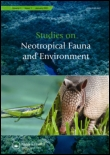
STUDIES ON NEOTROPICAL FAUNA AND ENVIRONMENT
Decoding the Complexities of Neotropical LifeSTUDIES ON NEOTROPICAL FAUNA AND ENVIRONMENT is a distinguished academic journal published by Taylor & Francis Ltd, dedicated to advancing the fields of Animal Science, Zoology, and Ecology. With an ISSN of 0165-0521 and an E-ISSN of 1744-5140, this journal has been a significant outlet for scholarly research since its inception in 1976, continuing to provide critical insights into neotropical biodiversity and the environmental intricacies of this rich ecological region through 2024. Recognized in the Q3 category for both Animal Science and Ecology, the journal ranks at #232/490 in Animal Science and Zoology and #402/721 in Ecology, marking it as a valuable resource for researchers, professionals, and students interested in ecological and zoological studies. By offering a platform for innovative research and comprehensive reviews, the journal aims to bridge the gap between theory and practical application, facilitating a deeper understanding of the unique challenges and conservation strategies relevant to neotropical ecosystems. Although not an open-access journal, it plays a crucial role in fostering academic discourse and knowledge dissemination in its field, ensuring that critical advancements in understanding neotropical fauna and environmental dynamics reach a diverse and engaged audience.
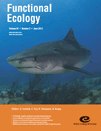
FUNCTIONAL ECOLOGY
Pioneering Research at the Intersection of Ecology and EvolutionFUNCTIONAL ECOLOGY is a premier journal published by WILEY that delves into the intricate relationships of organisms and their environments, addressing key themes in ecology, evolution, behavior, and systematics. Established in 1987, this influential publication has made strides in both foundational research and applied science, boasting a remarkable impact factor that positions it in the Q1 category for Ecology, Evolution, Behavior, and Systematics. With a Scopus ranking of #48 out of 721 in its field, it represents the cutting edge of ecological research, appealing to a diverse audience that includes researchers, professionals, and students striving to comprehend and address ecological challenges. Although the journal does not currently provide Open Access options, it remains a vital resource for those looking to deepen their understanding of functional ecology and its practical applications in sustainability and conservation. Join the community of scholars advancing ecological knowledge and its relevance in today's rapidly changing world.
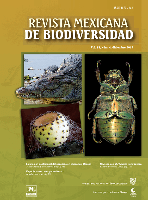
Revista Mexicana de Biodiversidad
Pioneering Research for a Greener TomorrowRevista Mexicana de Biodiversidad is a prominent academic journal dedicated to the field of biodiversity and conservation, published by the prestigious Instituto de Biología, Universidad Nacional Autónoma de México. Since its inception as an Open Access publication in 2005, it has aimed to disseminate high-quality research that advances the understanding of biological diversity in Mexico and beyond. With an ISSN of 1870-3453 and an E-ISSN of 2007-8706, the journal caters to a diverse audience, including researchers, professionals, and students, by providing vital insights into ecological studies, conservation strategies, and the sustainable management of natural resources. The journal is committed to fostering scientific collaboration and promoting the significance of biodiversity in addressing contemporary environmental challenges. By publishing innovative and impactful research, the Revista Mexicana de Biodiversidad plays an essential role in the global discourse on biodiversity conservation.
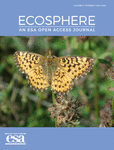
Ecosphere
Innovating research to illuminate ecological interactions.Ecosphere is a leading open-access journal published by WILEY, dedicated to advancing research in the fields of ecology, evolution, behavior, and systematics. Established in 2010 and headquartered in the United States, this innovative journal provides a platform for the exchange of cutting-edge scientific knowledge and discovery, fulfilling its mission to enhance our understanding of ecological systems and their interactions. With a prestigious impact factor reflecting its commitment to high-quality research, Ecosphere is ranked Q1 in both Ecology and Ecology, Evolution, Behavior, and Systematics for 2023, further solidifying its prominence in the scientific community. The journal's scope includes a wide array of topics related to environmental science, making it an essential resource for researchers, professionals, and students aiming to stay at the forefront of ecological research. It offers comprehensive open access options, ensuring that groundbreaking findings are readily available to a global audience, thus fostering collaboration and innovation in the field.
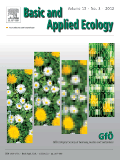
BASIC AND APPLIED ECOLOGY
Advancing ecological understanding for a sustainable future.BASIC AND APPLIED ECOLOGY, published by Elsevier GmbH in Germany, stands out as a premier journal in the field of ecology, evolution, behavior, and systematics. With its ISSN 1439-1791 and E-ISSN 1618-0089, the journal enjoys a distinguished reputation, evidenced by its classification in the Q1 category for Ecology in 2023 and impressively ranking #89 out of 721 in this domain according to Scopus. Since its inception in 2000, it has served as a vital platform for disseminating high-quality research that bridges theoretical insights and practical applications in ecology. Researchers, professionals, and students alike can look forward to the latest findings that not only foster a deeper understanding of ecological processes but also inform sustainable practices crucial for our environment. As the journal continues its journey through to 2024, it remains committed to advancing ecological knowledge and supporting innovative research in an ever-evolving field.